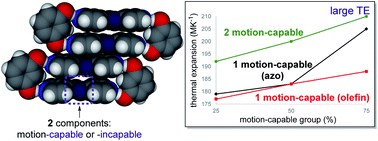Controlling thermal expansion within mixed cocrystals by tuning molecular motion capability†
Abstract
Controlling thermal expansion (TE) behaviors of organic materials is challenging because several mechanisms can govern TE, such as noncovalent interaction strength and structural motions. Here, we report the first demonstration of tuning TE within organic solids by using a mixed cocrystal approach. The mixed cocrystals contain three unique molecules, two of which are present in variable ratios. These two molecules either lack or exhibit the ability to undergo molecular motion in the solid state. Incorporation of higher ratios of motion-capable molecules results in larger, positive TE along the motion direction. Addition of a motion-incapable molecule affords solids that undergo less TE. Fine-tuned TE behavior was attained by systematically controlling the ratio of motion-capable and -incapable molecules in each solid.

- This article is part of the themed collection: Celebrating 10 years of Chemical Science


 Please wait while we load your content...
Please wait while we load your content...